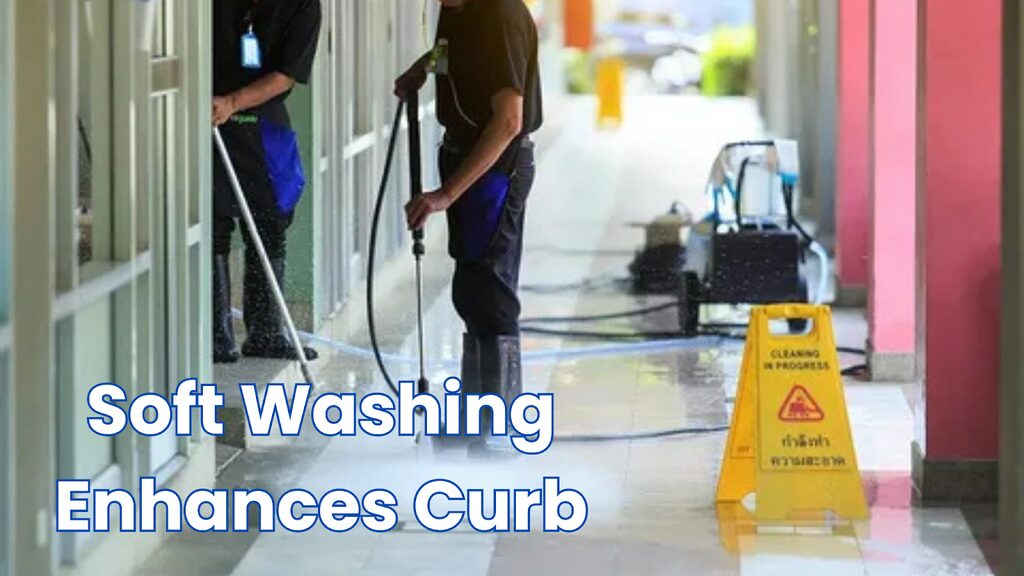Curb appeal plays a vital role in maintaining the beauty and longevity of your home’s exterior. It creates the first impression for visitors and potential buyers, making it essential to keep your property looking fresh.
An effective way to enhance curb appeal while prioritizing environmental responsibility is soft washing. Unlike traditional pressure washing, soft washing uses a gentler approach with low-pressure water and eco-friendly solutions, making it both effective and safe for your home and the environment.
What is Soft Washing?
Soft washing is a cleaning technique that involves using low-pressure water combined with specialized cleaning solutions to remove dirt, grime, algae, mold, and other contaminants from surfaces. Unlike pressure washing, which uses high-pressure water to blast away debris, soft washing is gentler on surfaces and prevents damage.
The key to soft washing lies in the chemical solution, which not only loosens dirt but also eliminates harmful organisms that can grow on the exterior of your home. Soft washing is commonly used on delicate surfaces such as roofs, siding, and fences, as it ensures that the integrity of these materials remains intact while effectively cleaning them.
How Does Soft Washing Improve Curb Appeal?
Soft washing can dramatically improve your home’s curb appeal by restoring surfaces to their original condition without causing any harm. Over time, dirt, mildew, and other buildup can make even the most beautiful homes appear dull and neglected. Soft washing can give your home a fresh, clean look by removing these unsightly marks and stains, making it look well-maintained and welcoming like:
Removing Mildew and Mold
Mildew and mold growth on your roof, siding, or driveway can make your home look old and unkempt. Not only do these substances affect your home’s appearance, but they can also lead to long-term damage if left untreated. Soft washing effectively removes these organisms while protecting your home’s exterior.
Restoring Roofs and Siding
Over time, roofs and siding can become covered in algae, moss, or dirt. This buildup reduces the beauty of your home and can cause long-term damage. Soft washing can gently remove these contaminants, ensuring that your roof or siding is restored to its original condition, instantly improving your home’s appearance.
What are the Environmental Benefits of soft washing
One of the main concerns homeowners have when it comes to cleaning their homes is the impact on the environment. Traditional pressure washing methods often use harmful chemicals and high-pressure water that can damage plants, pets, and the surrounding ecosystem. Soft washing, however, is designed to be safe for the environment as:
Low Water Usage
Unlike pressure washing, which uses large volumes of water at high pressure, soft washing uses less water while still delivering effective results. This means that less water is wasted, which is especially important in areas where water conservation is a priority.
Safe Cleaning Solutions
Soft washing relies on biodegradable, eco-friendly cleaning solutions. These solutions are safe for plants, pets, and wildlife, ensuring that your cleaning efforts do not harm the surrounding environment. By choosing soft washing, homeowners can clean their properties effectively while maintaining their environmental responsibility.
Preventing Chemical Runoff
Many pressure-washing methods use harsh chemicals that can end up running off into nearby lawns, gardens, and water sources. Soft washing solutions, however, are designed to minimize runoff, ensuring that any chemicals used during the process are safe for the environment and don’t cause pollution.
How to Get Started with Soft Washing for Your Home
To get started with soft washing, begin by assessing your home’s exterior. Identify areas like roofs, siding, or driveways that need attention. Knowing where dirt and buildup accumulate will help you prioritize the cleaning process. For example, areas in Connecticut might require more frequent cleaning due to weather conditions that cause more buildup.
Next, consider hiring a professional CT power washing service to keep your property in top condition. These Professionals use the right tools and eco-friendly solutions, making the process efficient and effective. Scheduling regular cleanings annually or as needed will help maintain your home’s appearance and prevent contaminants from building up over time.
How Soft Washing Compares to Traditional Pressure Washing
While pressure washing has long been a popular exterior cleaning method, it has drawbacks. Pressure washing can be too harsh for certain surfaces, leading to cracks, chips, or other forms of damage. Additionally, it often requires large amounts of water and powerful chemicals that can harm the environment.
Soft washing, on the other hand, offers a safer alternative that cleans without causing damage. For delicate surfaces like roofs or vinyl siding, soft washing is a much better option. It uses a gentle, low-pressure spray that cleans effectively without risking any harm to your home’s materials.
FAQs
Is soft washing safe for all surfaces?
Yes, soft washing is safe for most surfaces, including roofs, siding, and decks. It uses low-pressure water and eco-friendly solutions, making it gentle yet effective.
How often should I schedule soft washing for my home?
It’s recommended to schedule soft washing at least once a year, but depending on your location and buildup, more frequent cleanings may be needed.
Can soft washing harm my plants?
No, soft washing uses biodegradable, eco-friendly cleaning solutions that are safe for plants, pets, and the surrounding environment.
Conclusion
Soft washing is an effective, eco-friendly way to improve your home’s curb appeal. Using low-pressure water and safe cleaning solutions, removes dirt and mold without damaging surfaces, leaving your property looking fresh.
This method also reduces water waste and prevents harmful chemical runoff, making it a responsible choice for both your home and the environment. Regular soft washing ensures lasting beauty and protection for your exterior.

